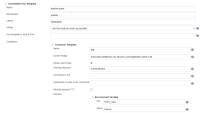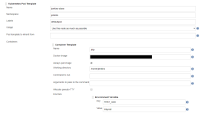-
Type:
Bug
-
Resolution: Not A Defect
-
Priority:
Major
-
Component/s: kubernetes-plugin
When I try to override the jnlp container image I still always get the alpine image and do not get the specified image. It seems that event hough i specify a container with the name jnlp it just ignores it and uses the default alpine image.
agent {
kubernetes {
label "human-review-ui-pipeline-${env.BUILD_ID}"
defaultContainer 'jnlp'
yaml """
apiVersion: v1
kind: Pod
metadata:
{{ labels:}}
{{ pod-template: jenkins-slave-npm}}
spec:
{{ containers:}}
{{ - name: jnlp}}
image: "redhat-cop/jenkins-slave-image-mgmt"
"""
- is duplicated by
-
JENKINS-56375 custom jnlp not working
-
- Resolved
-


